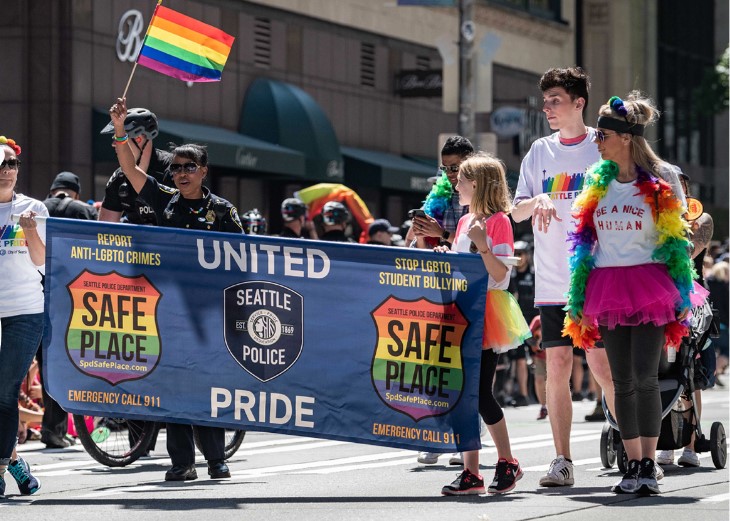A while back I went to a debate at Folio between the two candidates for Seattle City Council District 7, Bob Kettle and incumbent Andrew Lewis. It’s hard to call these things debates since mostly it’s windy presentations — not many specifics on which a voter might make a decision. Typical with these events, there’s little or no direct back-and-forth criticism or comment on each other’s positions. This is polite Seattle, where confrontation (at least when you’re in the same room as your opponent) must be avoided, and the agreed-upon topic of the evening was how to improve the Pike Place Market.
Both candidates talked a lot about policing (as the candidates do in all seven district races on the November ballot), but pretty much failed to recognize or offer solutions to the crime problem as Seattle residents and businesses experience it. Challenger Kettle’s website speaks more specifically to this, though.
A dominating subject was policing of public drug use, recently regulated, though rather loosely, by a City Council 6-3 vote adopting the state standard that this behavior should be a gross misdemeanor. Lewis voted no a couple weeks earlier but second time around voted with the majority, once provisions were added that arrest should not be the only option.
What the council enacted put police in the awkward position of deciding between arrest (weighing the user’s potential harm to self or others) or “handoffs to service providers” for – what? … drug treatment … or something. Without $10,000 to $15,000 to offer for drug treatment, the non-profit staffers working with addicted homeless people out on the streets don’t really have much they can do. At-large council member Sarah Nelson (not up for reelection this cycle) has been advocating unsuccessfully for city funding of drug treatment in these cases for a couple of years.
What happened at the Kettle-Lewis debate though was something of a contest to see who could talk about policing while at the same time ensuring that there would be a compassionate, helpful, understanding approach to the drug users and other homeless people in encampments or those just wandering city streets. Both talked favorably about the proposed new “first response” group being set up by Mayor Bruce Harrell to deal with those crises — mental health and overdoses mostly — that should not need armed officers to respond.
Despite former Navy officer Kettle’s view expressed on his website that there should be a larger police force (there used to be at least 200 more officers than we have now) focused on property crime, neither candidate got farther than just talking about how, unfortunately, just jailing the homeless for drug use or camping downtown truthfully is not a strategy that will end the problem.
What’s happened in Seattle is that the visibility of homelessness — coupled with real and serious problems with policing and what kind of people some of our police are — has eclipsed discussion of real crime issues. What really matters to residents and businesses and the city’s health is shoplifting. (Target stores and Mutual Fish and many small businesses say that’s a big reason they’re closing.) Some of the shoplifting involves large groups, apparently massively organized. (Luckily, we haven’t yet seen shoplifting mobs as reported on the East Coast.) What also matters is property crime, the worst of which has been a storm of home invasions – coupled with the nastiness of racial hate – as eloquently summarized by Claudia Rowe in Sunday’s Seattle Times opinion section.
Simply put, Seattle needs a police department large and smart enough (and openly responsive to review by the city’s Office of Police Accountability and Community Police Commission and others) to investigate and arrest those involved. That was done, though critics say too slowly, in the home-invasion cases. Organized shoplifting can be stopped with enough officers assigned to identify the leaders, largely drug dealers who recruit among the addicted homeless and send them into stores to get stuff that can be sold.
A similar strategy (again, with enough officers) can be used to cut down on crime by the homeless. I’ve lived near an encampment of 30 RVs occupied by homeless men, most truly down and out. But it was not difficult to identify from which vehicles the owners were dealing dope (with customers arriving all night) and, though a little more difficult, which RVs housed guys systematically involved in break-ins and theft.
It would be nice if the mayor and city council and voters decided these things were a priority and set about increasing the number of well-trained officers to do the job.

Excellent piece, Dick. Thank you. A limited number of criminal operators are using the general public sentiment of compassion as a shield to hide behind and to degrade city life.
I’ve heard a lot about “organized theft” but if not shoplifting mobs like on the east coast, what does that even mean? Businesses can exercise their right to close up shop here, but the reasons for it still seem murky to me.
Organized would include “… largely drug dealers who recruit among the addicted homeless and send them into stores to get stuff that can be sold.” But there’s more sophisticated, professional activity in that area.
What I have to think there isn’t, however, is shoplifting a lot of fresh fish. I checked around online and found no mention of that in the coverage of the Mutual Fish story. Not only is it a somewhat awkward item to slip into your pants, it loses even more resale value than shoplifted merchandise already does.
Thank you for writing this. I can’t understand, for the life of me, how our beautiful city has become so degraded….and has remained that way for years.